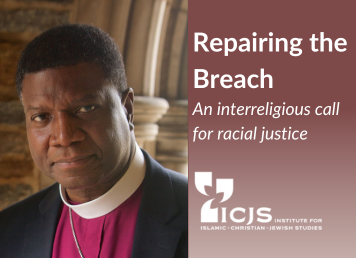
“The world has always been a multireligious, multiracial, multicultural world—even if our own religious upbringing has not embraced that reality,” says the Right Rev. Eugene Taylor Sutton, Bishop of the Episcopal Diocese of Maryland and ICJS Trustee.
Bishop Sutton says that it is difficult for people who are contained within the walls of their own traditions to think of the world in this way, “Anglican spirituality [of which the Episcopal Church is a part] allows for the openness to see what the Spirit may be saying to us and teaching us from other traditions. We can all learn from each other in our common humanity.”
Bishop Sutton became involved with ICJS when it was the Institute for Christian and Jewish Studies. [ICJS added Islam to its mission in 2013.] He realized that he needed to build relationships with other faith leaders. He says that ICJS helped him connect with the Jewish community in Baltimore, cemented by taking a trip to Israel with the Institute.
But in order to realize the “household of God that the Holy Scriptures envisioned,” he said, “we had to include more fully our Muslim brothers and sisters. If we can build bridges with the three Abrahamic faiths, that could be a sign of God’s vision for all people.”
Bishop Sutton focuses a significant amount of his work on justice, nonviolence, and reconciliation; therefore, he says, he loves the vision of ICJS—to build an interreligious society in which dialogue replaces division, friendship overcomes fear, and education eradicates ignorance.
“Nonviolence is very important for that. In order to have peace, you have to overcome ignorance and fear,” he says. “Our society is marked too much by what I call the ‘unholy trinity’—the intersection of poverty, racism, and violence. Where you see one of those, you will be led to the other two. So, in order to achieve that vision, you have to deal with the past. How do you heal the wounds of the past? You have to make restitution for the damage caused by previous generations. You have to repair it.”
This is where another large part of his work—reparations for African Americans—fits into the equation. In 2019, Bishop Sutton testified before the House Judiciary Committee for Congressional Bill HR40, which petitions for the establishment of a national bipartisan commission to study and make recommendations for addressing reparations as a redress for the centuries of slavery and systemic racism experienced by African Americans. Author and journalist Ta-Nehisi Coates, economist and author Julianne Malveaux, among others, testified alongside him.
He sees this principle reflected in Isaiah 58, which “talks about being a repairer of the breach.” In the United States’ case, the breach was made by the enslavement of African Americans and the subsequent century of systemic racism.
“Everybody wants forgiveness and to be reconciled, but you can’t do reconciliation on the cheap. It’s going to have to cost you something. The cost in the racial area is investing in impoverished Black communities when for centuries, society at large has taken resources and money out of the Black community.”
Bishop Sutton draws an interreligious parallel in two ways.
First, he emphasizes that during the Civil Rights Movement, the Jewish community was one of the Black Christian community’s biggest allies.
“To my Jewish brothers and sisters, I want to say, ‘you walked with us on the bridge into Selma. You walked with us and protested to achieve justice. Walk with us again to finish that job of repairing that damage, and for reparations.’ ”
Second, certain things need to be dismantled and torn down before repairs can be made, Sutton says.
“What would it mean if a group of Christians, Muslims, and Jews said, ‘we’ve all come from different pathways to this and we’ve all inherited a racial mess, much of it caused by religion. Let’s commit together to repair that mess that we’ve all inherited. We may not have caused it, but we’re a part of it.’
“It doesn’t make any difference if we’re Jewish, Muslim, or Christian, we’re all in the same boat now. Let’s repair the mess. Let’s all get behind reparations.”